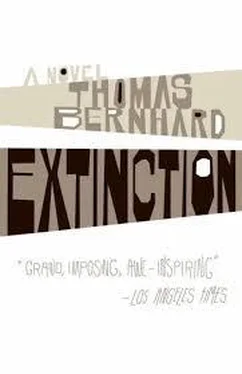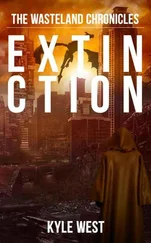never envisaged, I thought. I had considered every other possible situation time and again, but never this. I had often dreamed of dying and leaving them behind, of leaving them alone without me, of freeing them from me by my own death, but never of being left behind by them. The fact that
they were now dead and I was alive was not only utterly unforeseen, but quite
sensational. It was this sensational element, this overwhelming sensation, that I found shattering, not the simple fact that they were dead, irrevocably dead. Though my parents had been pathetic in every way, I had always regarded them as demons, and now suddenly, overnight, they had shrunk to the ridiculous, grotesque photo that I had in front of me and was studying with the most shameless intensity. The same was true of the photo of my brother. All your life you feared these people more than any others, I thought, and this fear cast a monstrous blight on your life. All your life you tried repeatedly to escape from them, but you always failed. You went to Vienna to escape from them, to London, to Paris, to Ankara, to Istanbul, and finally to Rome — all to no avail. They had to have a fatal accident and shrink to this ridiculous scrap of paper called a photograph before they could cease to harm you. The persecution mania’s over, I thought. They’re dead. You’re free. Looking at the photograph of my brother on his sailboat at Sankt Wolfgang, I felt sorry for him for the first time. In the photo he now seemed far more comic than when I had first looked at it. I was alarmed by my ruthless honesty. My parents too looked comic in the photo taken at Victoria Station. All three of them, lying on the desk in front of me, not four inches in height, fashionably dressed and in grotesque physical attitudes that betrayed mental attitudes no less grotesque, were even more comic than when I had looked at them before. The photograph reveals only a single grotesque or comic moment, I thought, not the person as he really was more or less all his life. The photograph is a perverse and treacherous falsification. Every photograph — whoever took it, whoever is pictured in it — is a gross violation of human dignity, a monstrous falsification of nature, a base insult to humanity. On the other hand, I found the two photos immensely characteristic of both my parents and my brother. That’s how they really are, I thought — or were. I could have brought many other photographs of my parents and my brother from Wolfsegg and kept them in my desk. The reason why I brought these is that they show my parents and my brother as they really were when I photographed them. I did not feel in the least ashamed of this thought. It was not fortuitous that I had brought these particular photographs to Rome and kept them in my desk instead of destroying them. What I have here are not idealized images of my parents, I told myself, but my parents as they really are — or were, I said, correcting myself again. And my brother as he really was. All three were so timid, so ordinary, so comic. I’d never have put up with falsifications but tolerated only true and genuine likenesses, however grotesque — and possibly repulsive. And it was this photo of my parents that I once showed to Gambetti, a year ago. I even remember where — at the café on the Piazza del Popolo. He looked at it, but made no comment, though I recall that after looking at it he asked,
Are your parents very rich? Yes, I said. I also remember that I later felt embarrassed at having shown it to him. You should never have shown him
that photo, I told myself at the time. It was stupid. There were — and still are — countless photos that show my parents looking
serious, as they say, but they do not correspond to the image I have always had of them. And there are serious photographs of my brother, but they too are misrepresentations. I would never have shown Gambetti any of these misrepresentations. In any case there is hardly anything I detest more than handing photographs around. I do not show people photographs, and I do not let them show me theirs. The fact that I showed Gambetti the one of my parents at Victoria Station was quite exceptional. What made me do it? Gambetti has never shown me any of
his photographs. Of course I know his parents, and his brothers and sisters, so there would be no point in his showing me pictures of them; he would never think of it. Basically I detest photographs, and it has never occurred to me to take any, except for the ones taken in London and Sankt Wolfgang, and another that I took in Cannes. I have never owned a camera. I despise people who are forever taking pictures and go around with cameras hanging from their necks, always on the lookout for a subject, snapping anything and everything, however silly. All the time they have nothing in their heads but portraying themselves, in the most distasteful manner, though they are quite oblivious of this. What they capture in their photos is a perversely distorted world that has nothing to do with the real world except this perverse distortion, for which they themselves are responsible. Photography is a vulgar addiction that is gradually taking hold of the whole of humanity, which is not only enamored of such distortion and perversion but completely sold on them, and will in due course, given the proliferation of photography, take the distorted and perverted world of the photograph to be the only real one. Practitioners of photography are guilty of one of the wont crimes it is possible to commit — of turning nature into a grotesque. The people in their photographs are nothing but pathetic dolls, disfigured beyond recognition, staring in alarm into the pitiless lens, brainless and repellent. Photography is a base passion that has taken hold of every continent and every section of the population, a sickness that afflicts the whole of humanity and is no longer curable. The inventor of the photographic art was the inventor of the most inhumane of all arts. To him we owe the ultimate distortion of nature and the human beings who form part of it, the reduction of human beings to perverse caricatures — his and theirs. I have yet to see a photograph that shows a natural person, a true and genuine person, just as I have yet to see one that gives a true and genuine representation of nature. Photography is the greatest disaster of the twentieth century. Nothing has ever sickened me so much as looking at photographs. And yet, I now told myself, the longer I look at the distorted images of my parents and my brother in these pictures — the only ones I ever took of them — the more I see the truth and the reality behind the distortion. This is because I’m not concerned with the photos as such; I don’t see the people portrayed in them as they are shown by the distorting lens of the camera but as I myself see them.
My parents at Victoria Station in London is written on the back of one photo. On the other is written:
My brother sailing at Sankt Wolfgang. I put my hand in the drawer and took out another photo. It showed Amalia and Caecilia posing in front of Uncle Georg’s villa in Cannes. Uncle Georg, my father’s brother, bought this villa with the money my father made over to him — a one-shot payment, as they say — after my grandparents died. He invested it so shrewdly in several French portfolios that he not only was able to live quite comfortably but could afford a degree of luxury that suited his tastes. He got a better deal than my father, I thought, looking at the photograph of my sisters with their rather mocking expressions. Uncle Georg died four years ago, as suddenly as his brother, after suffering a heart attack in his garden while inspecting his roses, which were his only passion in later life. At thirty-five he was able to leave Wolfsegg and retire to the Riviera with masses of money and loads of books. He loved French literature and the sea, and he devoted himself entirely to these two loves. It often strikes me that I take very much after Uncle Georg, at least more than after my father. I too have always loved literature and books and the sea, and I too left Wolfsegg, at an even earlier age. On the back of the picture are the words:
Читать дальше












